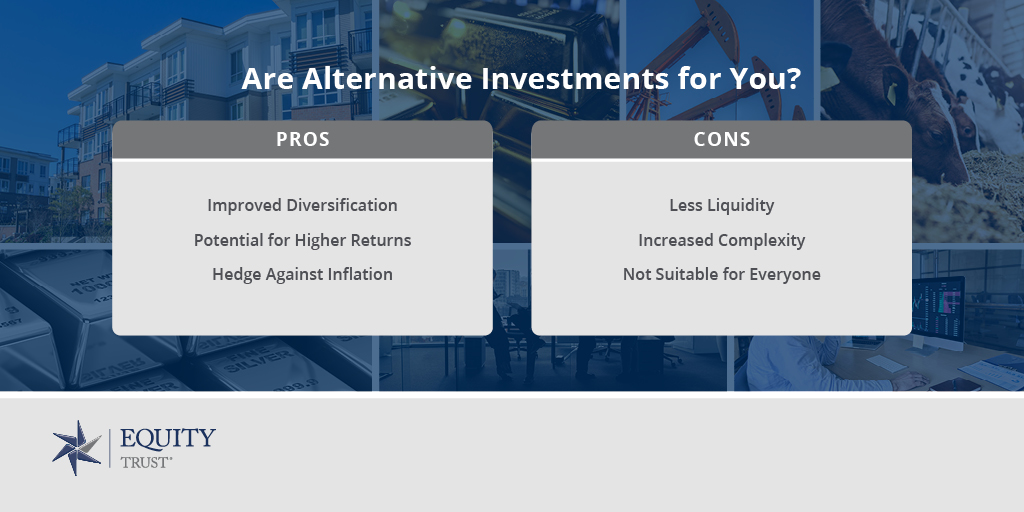Nearly Limitless Options
in One IRA
Invest in both traditional and alternative assets with a single custodian – ready to go beyond a self-directed IRA?
Investor Insights Blog|Alternative Investments Demystified: Pros, Cons, and How to Get Started
Self-Directed IRA Concepts

When it comes to investing, most people are familiar with traditional investments such as stocks, bonds, and mutual funds traded on public markets. However, there is another category of investments known as alternative investments or private market investments that are becoming increasingly accessible to a wider range of investors.
Alternative investments are assets that fall outside the realm of traditional investments. These investments are typically found in private markets and include asset classes such as real estate, private equity, hedge funds, commodities, cryptocurrencies, and precious metals. These investments often have unique characteristics and risk profiles that differ from those of traditional investments.
Investors can access alternative investments through various means, but generally there are two methods:
Inside a taxable account: Investors can purchase alternative investments directly through a taxable brokerage account.
Inside a tax-advantaged retirement account: Investors can also hold alternative investments within their retirement accounts, such as an IRA. A self-directed IRA, as it’s known in the industry, is an account held by certain custodians who custody alternative assets in retirement accounts. Equity Trust is one such custodian.
Many investors find it beneficial to invest in alternative assets with a retirement account because of the tax advantages. With a Traditional IRA, contributions are tax-deferred; with a Roth IRA, contributions are made after-tax, with tax-free withdrawals if you meet certain requirements. In both accounts, you’re not taxed on any capital gains generated from investments inside the account.
Even though alternative assets may be held in retirement accounts, it’s important to note that there is a small list of investments that are prohibited within these accounts, per IRS rules.
Video: What Are Alternative Investments
Here are some of the investments that may be held in a retirement account:

Pros:
Cons:
Anyone with an IRA can potentially invest in alternative assets, provided it’s held at a self-directed IRA custodian equipped to handle the investments. To open an IRA, you must first have earned income. Learn more about qualifications for an IRA.
Some types of alternative assets, such as private equity, had long been reserved for only accredited investors or the ultra-wealthy. In recent years, however, these investments have become more accessible to the average investor through various investment platforms and vehicles.
As with any investment, it’s essential to consider your risk tolerance, investment goals, and overall financial situation before allocating funds to alternative investments within your IRA.
You can begin investing in alternative investments in a retirement account in just a few steps with Equity Trust. It’s important that you have your account open and funded before you locate an investment; depending on your funding method, delays may cause you to miss out on your investment opportunity.
Here’s how to get started:
Looking to dive deeper into investments beyond traditional options? Watch this free, on-demand webinar to learn more about making alternative investments part of your strategy.
Diversifying Beyond the Stock Market: How to Get Started
You are leaving trustetc.com to enter the ETC Brokerage Services (Member FINRA/SIPC) website (etcbrokerage.com), the registered broker-dealer affiliate of Equity Trust Company. ETC Brokerage Services provides access to brokerage and investment products which ARE NOT FDIC insured. ETC Brokerage does not provide investment advice or recommendations as to any investment. All investments are selected and made solely by self-directed account owners.
Continue